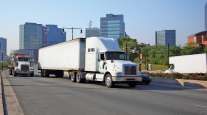Senior Reporter
Safety, Insurance Costs Cited in Study as Reasons to Consider Autonomous Vehicles

As autonomous vehicles become more commonplace on our highways and roads, drivers of both trucks and passenger cars are likely to become more accepting of the technology, a survey of U.S. consumers by the market research firm J.D. Power found.
Among respondents, 22% said they are likely to consider a “highly automated” vehicle for their next purchase, whether it be a truck or a personal vehicle. J.D. Power said it found that the results from this particular survey are applicable to trucks and private passenger vehicles.
Factors that would influence potential autonomous vehicle purchasers' decision
- 26% say the likelihood of fewer accidents
- 24% say it will make drivng less stressful
- 15% say they believe owning an autonomous vehicle would lower their insurance premiums
“We are well past the point of automated vehicles being a fad,” Tom Super, director of the Property and Casualty Insurance Practice at J.D. Power, said in an interview with Transport Topics. “We are in an all-out race to lead innovation in autonomous vehicle technology.”
It is estimated that 94% of accidents in the United States are caused to some degree by driver error. “The primary value proposition in autonomous vehicles is a lower rate of accidents,” said Super.
The J.D. Power report also looks at the possible future changes for insurance carriers that offer vehicle insurance. On this, 40% of those questioned said they are willing to change companies if autonomous discounts are offered by a competitor, and if their overall cost of vehicle insurance becomes lower.

Super
And 70% said they are expecting insurance companies to respond with discounts for vehicles equipped with advanced safety features.
“Consumers are looking for insurance carriers to respond to these types of partial autonomous features that are coming available and becoming much more prevalent within vehicles today,” said Super. “What we’re seeing from the market, from the insurance market overall, is that they are late movers. There are not a lot of carriers that are offering these related discounts for having partially automated vehicles and safety features.”
When it comes to personal liability and who would be at fault in a crash involving an autonomous vehicle, 40% of those questioned in the survey said that drivers will have some responsibility when an accident occurs in an autonomous vehicle. That 40% compares to just 22% who said the original equipment manufacturer (OEM) or the company that designed and built the safety sensor technology would be responsible for the accident.



